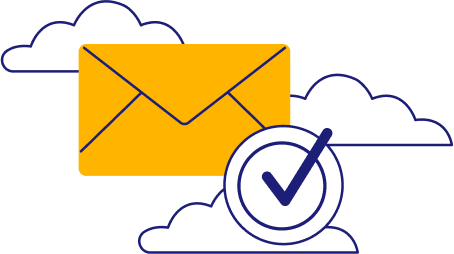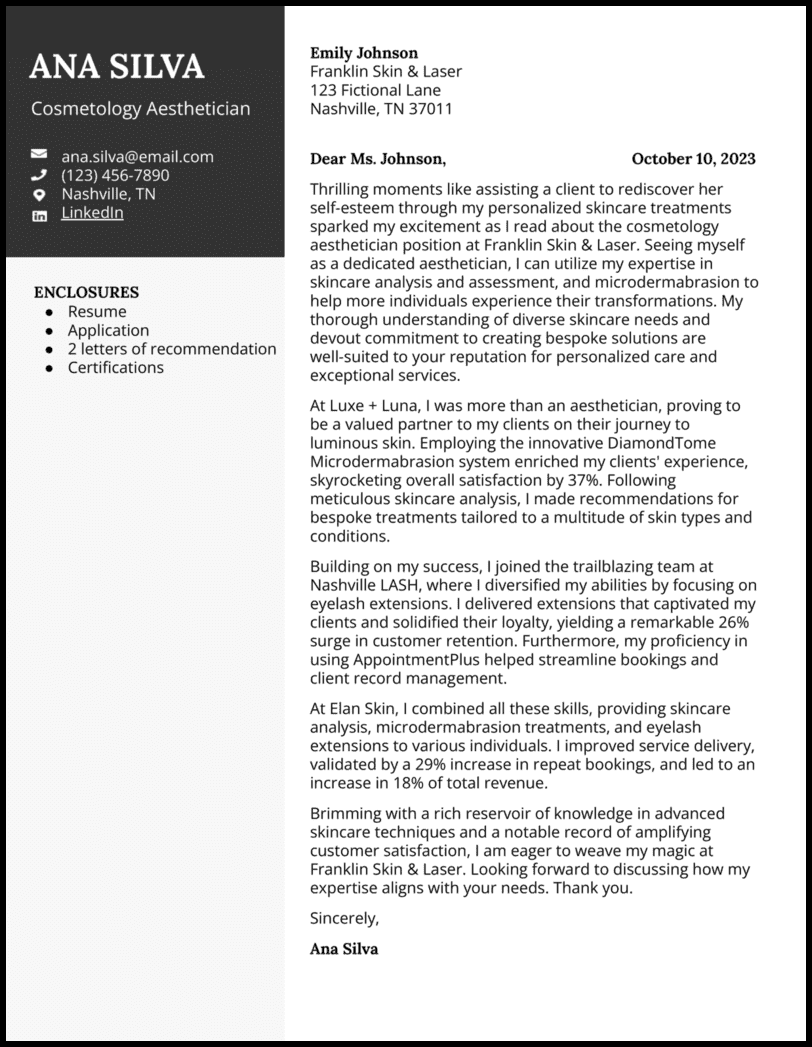When searching for jobs, you’ll find some listing a cover letter as optional. Naturally, it’s common to wonder, are cover letters necessary? You can submit applications faster when you don’t add a cover letter, but does that hurt your chances of success?
We’re here to provide you with the resources you need, from our AI cover letter generator to information that helps you understand the ins and outs of the hiring process.
In this article, we’ll discuss what a cover letter for a job is, whether it’s necessary, and tips for optimizing yours to stand out in today’s job market.
Introduction to Cover Letters

When you’re considering adding a cover letter for a job application, a lot of questions come to mind. What is a cover letter for a job? How are they used during the hiring process? Will a short cover letter suffice?
Let’s cut through that confusion with a quick overview of the purpose of cover letters and current trends affecting their use.

What is a cover letter?
A cover letter is a formal document traditionally submitted along with your resume and job application. Its purpose is to highlight your qualifications and why you want to work for a company.
Cover letters help you add a personal touch to your application rather than simply outlining skills and experiences on your resume. You can discuss aspects like your connection to a company’s mission and why you’re eager to use your top skills in the role. It’ll help the hiring manager see who you are as a person and how you’ll fit in with the company’s workplace culture.

Evolution of the cover letter
Technology and modern evolutions in the hiring process have changed some elements of cover letters and how they’re used.
Cover letters have been part of the hiring process for hundreds of years. 20-30+ years ago, it was a common practice to write or print one out as a physical letter that you’d send in the mail or drop off at a company’s location in person when you submitted your application. Cover letters back then tended to be a bit longer and more formal.
Nowadays, short cover letters are more common for modern, fast-paced hiring processes. Most of them will be submitted digitally–some in an attachment for an online job application, whereas others might be right in the body of an email, depending on the company’s preferences.
You also have many more tools to help in the process, like cover letter templates, AI cover letter generators, and grammar checkers to help you create a well-rounded and accurate overview of your professional capabilities.

Current trends in job applications
Current trends in the hiring process have made some professionals believe that the need for cover letters is trending downward.
Automated screening is one of the biggest trends that has impacted the hiring process. Tools like automated screening and applicant tracking systems (ATS) help sort through resumes by looking for keywords that applicants use.
For instance, if an accounting firm wants applicants with skills in Quickbooks, it may use ATS to sort through applications and find candidates with Quickbooks listed in their resume skills section. This helps quickly narrow down how much hiring managers have to review. It’s why some say cover letters aren’t necessary because hiring teams have more advanced tools to automatically narrow down the candidate pool without ever having to read a cover letter.
However, we still believe cover letters are necessary in that instance. Even if a company can narrow down the applicant pool from 100 to 47 using ATS, there are still a lot of candidates to review. Having a custom and professional cover letter is still likely a deciding factor that will help you stand out.
Another reason some say cover letters are trending downward is the number of generic letters that hiring managers see. When applicants just copy and paste the same letter for every job they apply to, it feels too impersonal. Not to mention, platforms like LinkedIn have AI tools that can automatically generate a cover letter. However, what LinkedIn’s tool writes usually sounds very generic.
Just as we recommend using a resume builder and resume checker for creating your resume, we also advise utilizing cover letter templates or generators as a starting point. Customize each cover letter to the job you’re applying for by highlighting specific details such as the company’s mission and the top skills they seek. According to a survey, 77.3% of employers prefer applicants who personalize their cover letters. Tailoring your letter to each job’s requirements will enhance your chances of success, making your application stand out during the hiring review process.
While some elements are causing professionals to believe cover letters are trending down, you can actually use it to your advantage to stand out when you take a bit of extra time to customize yours, add specific skills that connect with a company’s needs, and show genuine interest in the role rather than submitting something generic or no cover letter at all.
When to Include a Cover Letter

If you’re still wondering, “Do I need a cover letter?” let’s review the most common scenarios when you should include one in your application.

Job listings requesting cover letters
When a job listing requests a cover letter, you should always submit one.
Many hiring managers use the steps of the application process to gauge how you follow instructions and to verify your interest in the role. When you don’t submit a cover letter for a job listing requesting one, it might look like you didn’t read the instructions.
Not submitting a cover letter when requested might also make you appear underqualified for the role. Hiring managers could assume that if you didn’t add a cover letter, you might’ve felt you didn’t have enough relevant experience or qualifications to write about in one.
Lastly, if every other applicant submits one and you don’t, it puts you at a competitive disadvantage. You’ll likely get passed over in favor of candidates who took the time to show their enthusiasm about the role and detail how they’ll fit in with the company’s culture.

Opportunities for personal branding
What do you bring to the table that other applicants don’t? Your cover letter provides opportunities to highlight your personal brand and who you are as an individual. Adding in some of those personal details might even be why you get hired over other candidates with similar qualifications.
For instance, let’s say you’re applying for a marketing role with a golf brand. You’re an avid golfer, and highlight that in your cover letter, explaining how your knowledge of the industry will help you create impactful marketing materials targeting common consumer pain points. Compared to other candidates who just write about relevant skills, it’s more likely your identity as a passionate golfer will stand out to the company’s hiring team and show how you’ll fit their culture.
It’s similar to answering questions like “Why do you want to work here?” during interviews, where you can highlight your connection to the company’s mission, products, or industry to present why you’re an ideal fit for the role.

High-competition roles
As mentioned earlier, submitting a custom cover letter that’s specific to each role will help you stand out amongst other applicants who submit something generic or no cover letter at all.
Many industries today are highly competitive, such as IT, software development, finance, and marketing. Remote work opportunities also generally have tons of competition since companies may receive applications from candidates worldwide.
If you’re on platforms like Indeed or LinkedIn and seeing jobs with 100+ applicants for most positions you’re looking at, it’s safe to assume that there’s enough competition where a stellar cover letter is necessary if you want to rise to the top.

Career changes and gaps
It’s more challenging to present career changes or gaps on a resume since it focuses more on your career experiences and key skills. Therefore, when you need to justify a career change or gap, you should submit a cover letter to do so properly.
In the body of your cover letter, you can present why you made certain career moves, such as taking a break from work after a major health issue. Then, detail why you’re prepared to return to the field or enter a new career. For instance, how you’ve taken some refresher courses at your local college to ensure you’re up-to-date with current trends after your break from working.
Presenting those extra details will help you better represent yourself as an applicant and help hiring managers envision the impact you can have in the role.

Relocation and remote work applications
Submitting a cover letter is a good idea when applying to remote work opportunities or jobs that require relocation.
There might be points in your career where you’re planning a move to a new city or state and are applying to jobs ahead of time. You might also come across a great opportunity to further your career, but you need to move to join the company at its current location.
For either reason, you’d want to submit a cover letter that explains your intention to relocate. That way, even though hiring managers might see an out-of-state or out-of-city address on your application materials, they know you’re serious about the role.
Remote positions are highly competitive, and you’ll want to showcase how you’ll fit a company’s culture in a virtual work setting. While you can emphasize your abilities on your resume, a cover letter will help you better explain your experiences in remote environments, teleconferencing, communicating through email or platforms like Slack, and being a self-starter.
Situations Where Cover Letters May Not Be Necessary

While we usually recommend submitting cover letters for most jobs, there are some instances where they won’t be necessary. Let’s review those specific cases to help you determine if you need a cover letter for a job post you’re looking at.

Digital application platforms with limited space
Some companies simplify their application process to make it easier to fill out and for hiring teams to review candidates quickly. You might not need a cover letter if the application is just a simple form for your basic information. You might see this through Indeed’s Quick Apply feature, where some companies won’t include the option to attach a cover letter while applying.
That said, watch out for things like a small button you can click to attach your cover letter or when companies request you email your cover letter separately as one of the application steps.

Informal job markets and networking
Not every job or interview is acquired through a formal application process. For instance, you might have a professional connection that refers you to a company that needs your skills. In that case, the company’s hiring team might just schedule a meeting with you right away, or you might send the hiring manager a letter of interest after your connection gives you their contact information.
Some other instances where this might happen are:
- Landing an opportunity after meeting a job recruiter at a professional networking event
- Temporary contract roles that might forgo a formal application process
- Re-hires when you’ve worked for a company before
- When you connect with job recruiters on platforms like LinkedIn who’ve already seen your qualifications
- Employment agencies setting you up with a new role

Clear-cut qualifications and roles
Sometimes, employers just want applicants with clear-cut technical skills. You’ll see this occasionally with entry-level retail jobs, where companies won’t require a cover letter and instead prefer a resume stating some relevant work experiences.
The same can be true for temporary or seasonal hires where a company is trying to fill roles quickly. You’ll often see this when shipping and receiving businesses hire warehouse employees during the busy holiday season, especially for roles that don’t require much training to get started.

Entry-level positions
As mentioned, some entry-level retail roles might not require a cover letter when employers are confident they can train employees for the basic duties of the job. You might also see that in roles like:
- Entry-level warehouse positions where new hires will start with moving boxes or loading trucks
- Basic office/clerical jobs when companies just want new candidates to have fundamental skills in Microsoft Office or data entry
- Apprenticeships in trades like HVAC or plumbing, where new hires aren’t expected to have much knowledge outside of using typical hand tools
- On-campus jobs for college students that are part of work-study programs, which typically start you off with basic tasks like organizing returns in the library or cleaning up the campus kitchen
Best Practices for Crafting Effective Cover Letters

If you’ve found that a cover letter is necessary for the job you’re applying to after reading through this article, we have you covered. Here’s a quick overview of some best practices that will help you optimize yours to stand out. Plus, in the next section, we’ll detail some real-world examples for different industries you can use as templates, similar to how you’d use resume templates or resume examples, to get started.

Tailoring your cover letter
As mentioned earlier, it’s essential to customize your cover letter for each job you apply to. Some ways you can tailor yours to each position are:
- Start by greeting the hiring manager by name: When a hiring manager opens a cover letter and sees their name listed at the top, it immediately shows you did some research about the company. So, ensure you review the job description or company’s website to try to find the name of a specific contact person. If you can’t find anything, you could also begin with “Dear [name of company] hiring team.”
- Customize the skills and experiences you discuss for each role: While you’re likely applying to roles with similar job titles and responsibilities, each company has unique processes and needs. Review the job description to ensure you emphasize what’s important for every role.
- Connect to the company’s mission: When you show passion for the mission and goals a company is striving for, you’ll stand out as an applicant. For instance, discussing how you’re impressed by a company’s commitment to customer service could help reinforce your customer-facing capabilities and present how you’ll fit in with their culture.

Highlighting key skills and experiences
When highlighting essential skills and experiences, it’s important to tailor what you discuss to company needs and structure those examples appropriately.
A great way to stand out is to avoid just listing responsibilities and instead focus on achievements. For instance, instead of saying you were in charge of inventory systems, you could add more detail by describing how you used the Lightspeed Retail inventory software to manage stock updates 43% more efficiently and reduce product shortages by 55%.
Aim to use numbers to show your impact, such as including sales revenue generated, customer satisfaction rates, or return on investment.
Many companies also use different software or methodologies in their processes, so customizing those aspects to what they emphasize in job descriptions will help you stand out. For example, some accounting departments use Quickbooks, whereas others use Xero to manage data. If you had experience in both, you could tailor the experiences in your cover letter to stand out for varying company needs.

Showcasing personality and cultural fit
While a cover letter is a formal type of correspondence, there are still ways to showcase your personality and how you’ll fit a team’s culture to stand out in the hiring process.
A great way to start is to match your tone to the one used in the job description. For example, if the job description has a friendly and upbeat tone, matching that could show how you’ll be a great fit with the company’s team, which aims to provide friendly service to every customer.
The job description might also mention specific aspects of the company’s workplace culture. For example, they might emphasize an innovative and idea-driven workspace. Then, you could add examples like how you’ve innovated in previous roles by switching to cloud-based data management systems to boost information accessibility for remote employees by 39%.
Lastly, consider your brand. What do you bring to the workplace, and what abilities or unique experiences will make you an asset to the team? Presenting those aspects will help your personality and fit stand out as an applicant.

Conciseness and clarity
Your cover letter should balance adding relevant details while remaining concise. Keeping it to one page is a good way to ensure it remains brief and easy for hiring managers to review.
A good structure to keep your cover letter brief is a strong intro and conclusion and three to four body paragraphs outlining your most relevant skills and experiences.
You can typically focus on three to five skills relevant to what the company emphasizes in the job description and three to four examples of workplace achievements using your abilities.

Professional formatting and error-free writing
Each cover letter you submit should be in a professional format that shows you put time and effort into creating it. Ensure it contains essential details like your name and contact information, the date, your job title, and any enclosures. Cover letter templates and generators will give you a great starting point and structure.
Also, double-check the details you add about previous experiences to ensure the numbers you reference are accurate. You should also run it through a grammar checker and proofread it before submitting it to ensure you don’t have errors that will detract from its professionalism.
Best Cover Letter Examples


Cover letter example for the beauty industry
In the beauty industry, you typically need to present technical and customer-facing service skills to stand out in the hiring process.
Take a look at the example below for a cosmetology aesthetician. The applicant does an excellent job showcasing relevant skills like microdermabrasion and skin analysis. Plus, they have several examples throughout that showcase their ability to achieve the company’s mission of personalized care and exceptional service, such as how they improved customer satisfaction and increased repeat bookings in previous roles.
Why this cover letter works
- Kick off your cosmetology cover letter with a captivating introduction emphasizing your enthusiasm for the beauty industry and eagerness to add value to the hiring company.
- From there, proceed to narrate the unique experiences you bring to the table, focusing on industry-relevant proficiencies like skincare analysis, eyelash extension, and microdermabrasion treatments. Typical quantified impacts to highlight here include customer satisfaction and retention, appointments, and revenue generated.

Cover letter example for childcare professions
When you work in the childcare industry, you must showcase how your technical and interpersonal skills will help get the best results for every child you watch on the job.
The nanny cover letter example below showcases how you can do just that, even if you have no experience. The applicant does a great job presenting how their volunteer work providing healthy child-friendly meals at non-profits and previous experience as a housekeeper will help them safely and effectively manage busy homes.
Why this cover letter works
- Even without prior experience in this role, demonstrating initiative, passion for child care, and subtle praise for the prospective employer will no doubt spark the recruiter’s attention.
- However, don’t hesitate to draw from moments with relevant wins to fortify your nanny no experience cover letter. That will go a long way to keep your application away from the dreaded email “Trash.”

Cover letter example for creative fields
Companies hiring creative professionals will want to see how you use your creative vision to achieve great results in a business environment. Plus, every business has its own style, so being able to tailor how your artistic skills will fit their needs will help you stand out.
The example below for an interior design student applying to an internship achieves that delicate balance in a cover letter even when the candidate lacks real work experience. They’re able to relay how their results in class projects using color theory, and participation in a residential design competition following building codes will help them perform effectively on the job.
Why this cover letter works
- It’s typical for internship candidates to underscore their academic prowess and eagerness to learn. But why not go a step further to illustrate your ability to effectuate tangible outcomes in the real world of interior design?
- Let a previous impactful internship take the lead, backed up by your quantified wins (cue expediting project approval by two weeks). If this isn’t an option, a college project, an industry-centric competition, or a workshop you attended could play a terrific role in your interior design student cover letter.

Cover letter examples for education careers
The education industry is full of roles that require accuracy, high levels of knowledge, and the ability to achieve great results for students. Your cover letter must balance those aspects while relating to organizational needs to get the best results.
Cover letter example for a teacher
The elementary teacher example below does a terrific job since the applicant relates to the school’s mission of academic excellence while detailing top-notch achievements, like helping boost test scores and reading proficiency with their lesson planning structure.
Elementary Teacher Cover Letter Example
Copy this text for your elementary teacher cover letter!
123 Fictional Avenue
Dallas, TX 78660
(123) 456-7890
August 20, 2026
Benjamin Brown
Coppell Independent School District
123 Fictional Lane
Dallas, TX 78660
Dear Mr. Brown:
I am captivated by Coppell Independent School District’s unwavering dedication to academic excellence and inclusiveness, as evident by your impressive state test scores and expansive student population. It is commendable that your school excels in cultivating well-rounded students and promoting a diverse learning environment. Being EC-6 Standard certified, I am excited to contribute to your mission as an elementary teacher, leveraging my strengths in educational technology integration and special education strategies.
During my 2014-2019 tenure at Walnut Hill Elementary School, I was instrumental in the school’s growth to a score of 87%. This was achieved by implementing new digital learning platforms that increased reading proficiency by 8% within two semesters. Employing proven special education strategies, I led a class of 22 students, 32% with learning disabilities, in exceeding their growth targets by an average of 18%.
At Willian B. Travis Academy, I took charge of blending learning models, resulting in a 7% better student engagement rate in my classroom. Furthermore, I emphasized digital literacy across all subjects and grades. This initiative introduced students to essential 21st-century skills, enabling a 14% improvement in their performance on state tests in tech-based assignments.
The Coppell Independent School District’s emphasis on a comprehensive, inclusive educational approach is commendable and is what drives my interest in becoming a part of your esteemed faculty. My motivation to see every child thrive and commitment to utilizing technology for inclusive learning would further elevate the school’s academic standing.
I would be thrilled to discuss how my background and abilities align with your needs and contribute to the Coppell Independent School District’s vision of academic excellence. I
appreciate your consideration, and I am eagerly awaiting your positive response.
Sincerely,
Rahul Nisha
Enclosures:
Resume
Application
2 letters of recommendation
Transcripts
EC-6 Standard Certificate
Why this cover letter works
- Proficiency in behavior and classroom management, child first aid, curriculum development, lesson planning, teaching strategies, compassion, and public speaking is critical in this role.
- Demonstrate value in your elementary teacher cover letter by narrating quantified wins empowered by some of these skills. Then, subtly pay homage to the potential employer’s reputation to better resonate with the recruiter.
Cover letter example for academic leaders
While applying to academic leadership roles, such as a principal or superintendent, you’ll need to present top-notch leadership, decision-making, and coordination abilities to achieve the best results for schools.
The principal cover letter example below provides an excellent overview of how the applicant’s budget management and data analysis skills will help them fit in nicely at Heritage Hall School as they work toward providing a high-quality holistic educational program.

Cover letter example for engineering careers
Engineering careers require several technical skills and extensive education, which you should present on your cover letter.
Even after completing your education, you’ll still likely need to apply for some apprenticeships or internships to break into the field. The example below for an electrical engineering apprentice showcases how the applicant’s coursework at San Jose State University equipped them to perform hardware design accurately and how a previous internship helped them gain hands-on firmware troubleshooting experience that will lead to success in the role.

Cover letter examples for finance and accounting jobs
You need a professional cover letter in finance jobs where compliance and accuracy are essential to ensure proper cash management. Here are a couple of examples to show you how to organize yours successfully.
Cover letter example for the banking industry
The electronic banking specialist example below provides a great overview of how the applicant’s technical skills in fraud management systems and financial database tools will make them effective in the role.
Cover letter example for an accounting job
As you move into high-level accounting roles, you’ll want to ensure you present a long tenure of accuracy and compliance in your cover letter. Take a look at the example below for a senior accountant. It does a terrific job showcasing how the applicant’s skills in balance sheets, invoices, and client management will help them provide effective financial service in the hospitality industry.

Cover letter examples for food service careers
In food service, you need to manage kitchen safety, health codes, and great customer service to achieve success. Therefore, you’ll want to ensure your cover letter provides the ideal balance of skills while relating to each restaurant’s mission to stand out.
Cover letter example for an entry-level food service role
It’s not uncommon for food service roles to be one of the first jobs someone has while looking to gain work experience. Even if you don’t have much experience, you can still find transferable skills from volunteer work, school clubs, or class projects that will help showcase your capabilities.
Take a look at the example of the hostess cover letter below. Even though the applicant doesn’t have experience working at restaurants, they can still show how their time in their university’s computer club helped them gain problem-solving skills and how a previous internship helped them master product demonstration skills that will be necessary as a hostess.
Cover letter example for a restaurant leadership role
When you grow into a leadership role in food service, you’ll want to present knowledge of the industry and how you coordinate financial requirements and employee schedules in your cover letter.
The restaurant general manager example below showcases the applicant’s hands-on management style and technical skills in food cost analysis that will help them perform well in the role.

Cover letter example for the healthcare industry
Healthcare roles require you to show technical treatment capabilities and how you’ll provide a top-notch patient experience throughout the process, even in stressful moments.
Look at the cover letter example below for a dermatology physician assistant. The applicant does a great job showcasing how their genuine care for patients, and knowledge of cryotherapy and skin biopsies that will help them achieve top results in the role.

Cover letter example for information technology (IT) jobs
IT jobs require a wide array of technical skills to ensure you can quickly troubleshoot systems and improve company processes on the job. You’ll want to ensure you present the results you’ve achieved appropriately on your cover letter.
The IT support example below does that well, detailing achievements where they used remote optimization techniques to reduce system downtimes and network maintenance costs while working in fast-paced environments.
Are Cover Letters Necessary FAQs

Cover letters aren’t obsolete in 2026. When written and formatted correctly, they can be an essential way to stand out amongst applicants in the hiring process. Make sure each one you submit is tailored to the company you’re applying to by showing your connection to their mission and stating relevant skills and experiences.
A strong cover letter can help you explain gaps in your resume or how you’ll make an impact as an entry-level applicant with minimal experience. However, if you’re completely unqualified for a position, a strong cover letter alone probably won’t make up the difference to land an interview.
You should always customize your cover letter to ensure it stands out for each company’s needs and showcases your interest in the role. Ensure you greet the hiring manager by name rather than using generic greetings like dear sir/madam. Show passion for the company’s mission and customize the skills you discuss to what’s emphasized in job descriptions.
Your cover letter should be one page long. You don’t want to include too many details that will lose a hiring manager’s attention during fast review processes. Stick to a strong intro and conclusion with a few great body paragraphs detailing relevant skills and experiences.
The most common mistakes in cover letters are not greeting the hiring manager by name, grammatical errors, improper formatting, and copying and pasting the same generic cover letter each time. Customizing it to the specifics of the job description, using grammar checkers, and cover letter templates or generators will help.
If an online application has a space to submit a cover letter, you should always do so to give yourself the best opportunity to stand out amongst other candidates. That said, some online applications don’t have a place to submit cover letters, so unless otherwise specified where you should submit them, you can go without one in that instance.








